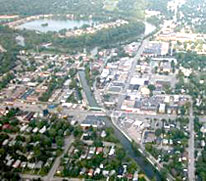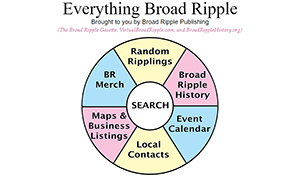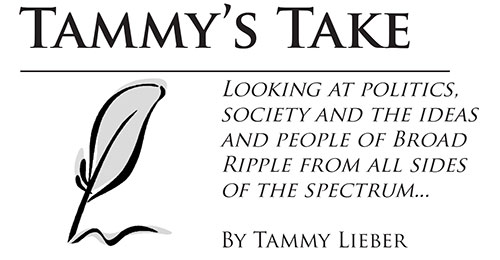
|
Broad Ripple Random Ripplings

The news from Broad Ripple
Brought to you by The Broad Ripple Gazette
(Delivering the news since 2004, every two weeks)

|
| Brought to you by: |

|

|

|

|

|

|
Converted from paper version of the Broad Ripple Gazette (v04n21)
Tammy's Take - By Tammy Leiber
posted: Oct. 19, 2007

For obvious reasons, I'm a news junkie. News is, after all, what I've spent most of my adult life doing. I find, though, that many people who aren't in the news business are genuinely interested in how news is developed and delivered. If you're one of those people, read (or jump) to the end of this column.
Generally, it seems there's an understanding that to be an informed, responsible citizen, you have to have some relationship with news, however you choose to get it.
Me, I'm a dinosaur.
I prefer to read news, rather than watch it or listen to it. For me, it's most tangible, most real, most easily absorbed that way. Plus, I'm generally a low-tech person. Newspapers don't require batteries or cords or buttons that I can't figure out.
Nationally, though, the consensus is that newspapers are dying. Some would say they're already dead. In their place is lightning-fast electronic and television news, blogs, e-newsletters, the Daily Show, whatever.
Last week, I met with a friend who has built a successful "new media" company in Broad Ripple. When we met almost 10 years ago, "new media" largely referred to corporate websites, then still predominantly used by large companies. Now his firm does things for businesses that involve blogs and search engine optimization and using company news to attract customers in the age of Google.
He put in my hands a copy of a white paper from a leading technology information firm. Its subject was the changing face of news and it included lots of information and graphics in an easily digestible, annotated form. This report took the position that no one is more qualified to report news than readers. Credibility is crucial, it maintained, which is why readers should elect the best writers among their own ranks to write authoritative articles.
It was one of several interesting points the author made. The thing is, I couldn't get past the numerous grammatical and typographical errors in the paper. In my mind, careless errors speak to credibility-what else is the writer getting wrong if he doesn't grasp the meaning of "refutable"? But maybe being a stickler for grammar makes me a dinosaur, too.
Unquestionably, newspapers are changing. Nationally, editors of big major daily newspapers speak about the difficult economic climate they operate in. For readers, that generally means fewer reporters, less time spent ferreting out stories and digging up the context that makes the headlines meaningful.
Here's a news flash: big newspapers do, in fact, still make money. Gannett Co. Inc., owner of the Indianapolis Star and about 1,400 other newspapers, made $3.6 billion in profit-profit, not revenue-last year. The Tribune Co., owner of Chicago Tribune et al, made $2.78 billion. If my bottom line looked like that, I'd be pretty happy. I'd also be pretty happy with the $2.95 million salary that Gannett Chief Craig Dubow made last year, but I digress.
The shareholders who own these public companies don't see it that way. They see a mature industry under pressure from new forms of competition and they see declining trends in sales and profit. The companies respond by cutting costs however they can in order to boost profit margins. Such is the nature of business.
An interesting side effect of all these changes in the news business is newspapers like the one you're holding in your hands. Locally, newspapers like the Broad Ripple Gazette and the Urban Times (which covers downtown neighborhoods) have surged in popularity in the past few years and have rapidly grown in terms of coverage. My theory is that people pick up these papers because other media outlets have cut resources and no longer cover neighborhoods of our city like they once did.
I don't think I'm divulging any big secret when I say that the people who produce and write for these neighborhood newspapers aren't motivated by promises of fat bottom lines. Gazette Editor Alan Hague may correct me, but I suspect the papers' salaries in total come in somewhere south of $2.95 million.
The motivation instead is public service journalism-the idea that people need and want to know what's happening around them and that there's value to society in informing people about things that affect them. It's an idea that drives most of my colleagues in the business to do what they do every day.
To an extent, this is all navel-gazing theory. What I really want to know is, why are you reading this? What makes you pick up the Gazette every other week? What's here that you can't get anywhere else? E-mail me at tammy@broadripplegazette.com.
Tammy Lieber is a freelance writer who lives in Meridian Kessler, otherwise known as SoBro. A former reporter at the Indianapolis Business Journal, she now writes journalism and marketing pieces when she's not fixing up her house or enjoying the company of friends over a pint of Guinness. Her favorite spectator sport is politics, except on Sundays during football season. Email her at tammy@broadripplegazette.com
tammy@broadripplegazette.com

|

|

|
| Brought to you by: |

|

|

|
| Brought to you by: |

|

|

|


